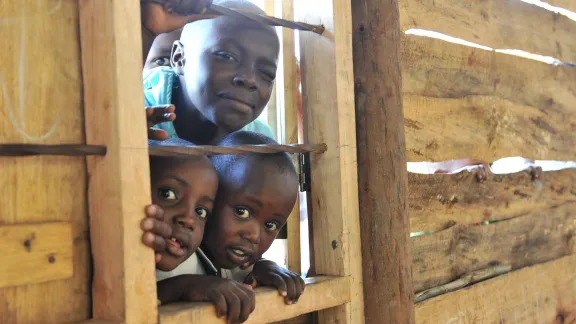
Children looking by a window at the Katalyeba Early Learning Center, in Rwamwanja, Uganda. The center welcomes children from both the host community and the refugee settlement. Photo credit: LWF/M. Renaux
Meeting urgent needs to build a sense of security
(LWI) - The Lutheran World Federation (LWF) and its partners in southwestern Uganda are responding to a new wave of refugees from the Democratic Republic of Congo (DRC) who are fleeing violence. The population surge has led to a shortage of basic resources and services, compelling the LWF to urgently scale up assistance and protection with partners.
A large wave of refugees flee to Uganda for safety
The recent uptake in fighting between rebels and government forces in DRC has led to over 7,500 refugees arriving at the Rwamwanja refugee settlement throughout February and March. In 2021 the settlement, located in the southwestern Kamwenge district of Uganda, was home to 76,000 residents, 1,000 of whom have special needs. Typically, newly arrived refugees are settled into their new Rwamwanja homes in clusters. Once one group was settled in then the next would be onboarded. The sudden large volume of arrivals has disrupted the regular intake process, increasing the need for services and humanitarian assistance.
Coping and improving access will require the combined efforts of partners, funders, the government and the host community. LWF has a strong response, but more resources are still needed to properly address the needs.
LWF quality services programs aim to fill the gap in resources, basic needs, livelihoods, protection and water sanitation and health (WASH). Through the Uganda Cash Consortium, LWF is addressing immediate basic needs for the most vulnerable newly arrived refugees with multi-purpose cash assistance. The cash assistance is supported by funding from the Directorate General for European Civil Protection and Humanitarian Aid Operations (DG ECHO).
Yelemia Sembuka, 34 years a recently arrived refugee, said “the security in Uganda is good because we sleep without any disturbance or fear at night. The major challenge is water because the nearest borehole is two kilometers away. We also have no latrines, and the health facility is far from our homes.”
Within three weeks of the response, LWF completed drilling three of five boreholes with funding from ACT Church of Sweden and Evangelical Lutheran Church in America. LWF has also commenced support towards solid waste management at the Mahani reception center and provides fuel for the Nkoma Katalyeba Town Council waste collection truck as well as technical oversight.
Expanding resources to bridge the gap
“In recent days we have seen the refugee situation change for the worse,“ said Ambrose Ogwang-Sub, LWF Program Manager in Rwamwanja. “So far, we have received over 7,500 unanticipated refugees who are in dire need of water, livelihoods, and protection services. Scarcity has created a sense of competition for existing resources. Coping and improving access will require the combined efforts of partners, funders, the government and the host community. LWF has a strong response, but more resources are still needed to properly address the needs.”
Support from Bread for the World is helping bridge some of the gaps. However, as the influx of refugees continues, additional resources are critical to ensure that vulnerable populations who are already in place and newly arriving refugees have access to clean water, sanitation, food and physical safety. Major components of LWF’s response include supporting households of persons with special needs with cooking fuel, agricultural tools and seeds for fast maturing crops to supplement staple food. In times of conflict, providing psychosocial support to people with mental distress and other protection needs is also a fundamental aspect of LWF’s strategic approach.
As resources become scarce, the additional support and continued commitment of the LWF and its partners are critical for communities in Rwamwanja to fill emerging gaps in quality services, protection and social cohesion as well as livelihoods.
By LWF/T. Rakoto


